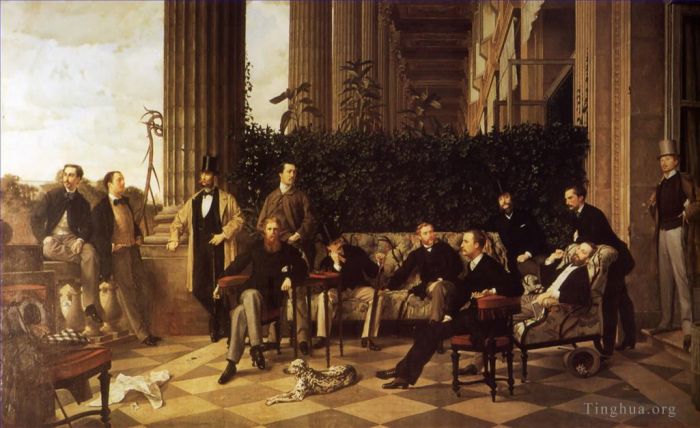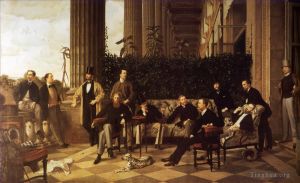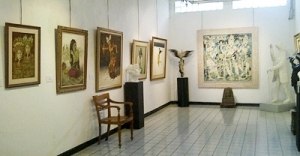The Circle of the rue Royale
James Tissot
- Price: Price on Request
- Art Type: Oil Painting
- Size:
- English Comments: 0
- International Comments: 0
- Creating Date:
- Introduction and Works of James Tissot >>
Work Overview
- The Circle of the Rue Royale
James Tissot
Original Title: Le Cercle de la rue Royale
Date: 1868
Style: Realism
Genre: genre painting
Media: oil, canvas
Dimensions: H. 174.5; W. 280 cm
Location: Musée d'Orsay, Paris, France
This imposing group portrait commissioned from Tissot at the end of the Second Empire invites us to access the intimacy of the Circle of the Rue Royale, a male club founded in 1852. Each one of the twelve models paid 1000 Francs for the painting to be made, and the final owner was to be determined via a special draw. Baron Hottinger, seated to the right of the sofa, was eventually named the winner. The painting remained in his family until it was acquired by the Musée d'Orsay. Among the most remarkable personalities of the group is the Marquis de Galliffet, who would later be a ferocious opponent to the Paris Commune in 1871, standing to the right of the painting and leaning on an armchair where Prince Edmond-Melchior de Polignac is sitting. Standing to the far right of the painting is Charles Haas, who years later would become one of Marcel Proust's sources of inspiration for the character of Swann in Remembrance of Things Past.
Son of a fashion seller and a milliner, Tissot always gave particular attention to clothes in his painting. The Circle of the Rue Royale offered every opportunity to express this interest and demonstrate an extreme accuracy that vied with that of photography. Costumes and accessories rendered with many details testify to the taste of the aristocracy in the 1860s whilst showing the social status of these men captured in prestigious surroundings.
The scene takes place on one of the balconies of the Hôtel de Coislin that still overlooks the Place de la Concorde. The carriage and passers-by one can see through the balustrade convey the animation of the square, whilst above the trees one can distinguish the roofs of the Palais de l'Industrie built for the 1855 World Fair and now destroyed.
Not unusual for Tissot, the painter seems to have played with different registers, mingling several artistic references. Still loyal to Ingres's teaching, close to those who were to become the Impressionists, he broke free from French tradition by staging this group portrait outside, in the style of British conversation pieces.
A major example of Tissot's modernity, emblematic of the intellectual and mundane atmosphere of the time, this piece contributed to the young painter's recognition as he was emerging as one of the most talented portrait painters of his generation.
- Copyright Statement:
All the reproduction of any forms about this work unauthorized by Singing Palette including images, texts and so on will be deemed to be violating the Copyright Laws.
To cite this webpage, please link back here.
- >> English Comments
- >> Chinese Comments
- >> French Comments
- >> German Comments
- >>Report
- The Return of the Prodigal Son
- The Ball on Shipboard
- The Tedious Story
- Young Lady in a Boat
- Holyday
- The Concert
- An Interesting Story
- The Gallery of HMS Calcutta
- The Repentant Magdalene
- Childrens Party
- The Hull Of A Battle Ship
- A Reclining Lady
- A Convalescent
- Orphan
- Autumn on the Thames
- In the Louvre
- The Stairs
- The Prodigal Son In Foreign Climes
- Young Women Looking at Japanese Objects
- The Return from the Boating Trip
- A Woman of Ambition
- Jeune Femme A L eventail
- Unaccepted
- Waiting for the Ferry
- A Woman in an elegant Interior
- Young Ladies Looking at Japanese Objects
- During the Service Martin Luthers Doubts
- Portrait of the Pilgrim
- Le Rendez Vous
- Without a Dowry aka Sunday in the Luxembourg Gardens
- Mary Magdelane before Her Conversion
- Dans la serre
- Letter L with Hats
- The Confidence aka The Admission
- Beating the Retreat in the Tuileries Gardens
- A Widow
- Croquet
- Kathleen Newton In An Armchair
- Ruins
- By the Thames at Richmond
- What Our Saviour Saw from the Cross
- A Fete Day at Brighton
- Colonel Frederick Gustavus Barnaby
- La cheminee
- Reading the News
- The Bridesmaid
- Marguerite in Church
- Portrait of Mlle L L
- Vicomtesse De Montmorand
- The Prodigal Son The Fatted Calf
- The Prodigal Son The Departure
- Room Overlooking the Harbour
- The Artists Ladies
- On the Thames
- The departure Platform Victoria Station
- The Terrace Of The Trafalgar Tavern Greenwich London
- The Widower
- Triumph Of The Will The Challenge
- Portsmouth Dockyard
- The Plague of Locusts
- Mavourneen
- Mary Magdalenes Box of Very Precious Ointment
- At The Louvre
- In Church
- Self Portrait
- Boarding the Yacht
- The Apparition
- Faust and Marguerite in the Garden
- Young Women Looking at Japanese Objects2
- Young Lady Holding Japanese Objects
- The Princesse De Broglie
- Portrait of Miss Lloyd
- Going to Business
- Jesus at Bethany
- The Captain and the Mate
- The Thames
- London Visitors
- Waiting for the Ferry 2
- Marguerite Au Rempart
- The Traveller
- July
- Uncle Fred
- Quiet
- Goodbye on the Mersey
- On The River
- Algeron Moses Marsden
- A Luncheon
- La Soeur Ainee
- The Last Evening
- Gentleman in a Railway Carriage
- Le Comedien
- October Tissot
- Type Of Beauty
- The Woman of Fashion
- The Sporting Ladies
- October
- A Passing Storm
- Behold He Standeth behind Our Wall
- A Little Nimrod
- The Political Lady
- Bad News
- The Captains Daughter
- Partie Carree
- The Garden Bench
- Spring Specimen of a Portrait
- The Shop Girl
- In the Sunshine
- Spring
- The Fan
- At the Rifle Range
- Too Early
- The Farewell
- The Prodigal Son The Return
- The Bunch of Lilacs
- Portrait De Femme A LEventail
- The Magi Journeying
- Hide and Seek
- Reading a Story
- In an English Garden
- Un Dejeuner
- The Annunciation
- Mrs Newton with a Parasol
- Emigrants
- In the Conservatory
- The Two Sisters Portrait
- Evening (The Ball)
- The Circle of the rue Royale
- The Letter
- The Ladies of the Cars
- Study For The Prodigal Son In Modern Life The Depature
- Portrait of an Actress in 18thC Dress
- A Lady In A Black And White Dress
- Au Louvre
- A Dandy









 Singing Palette
Singing Palette